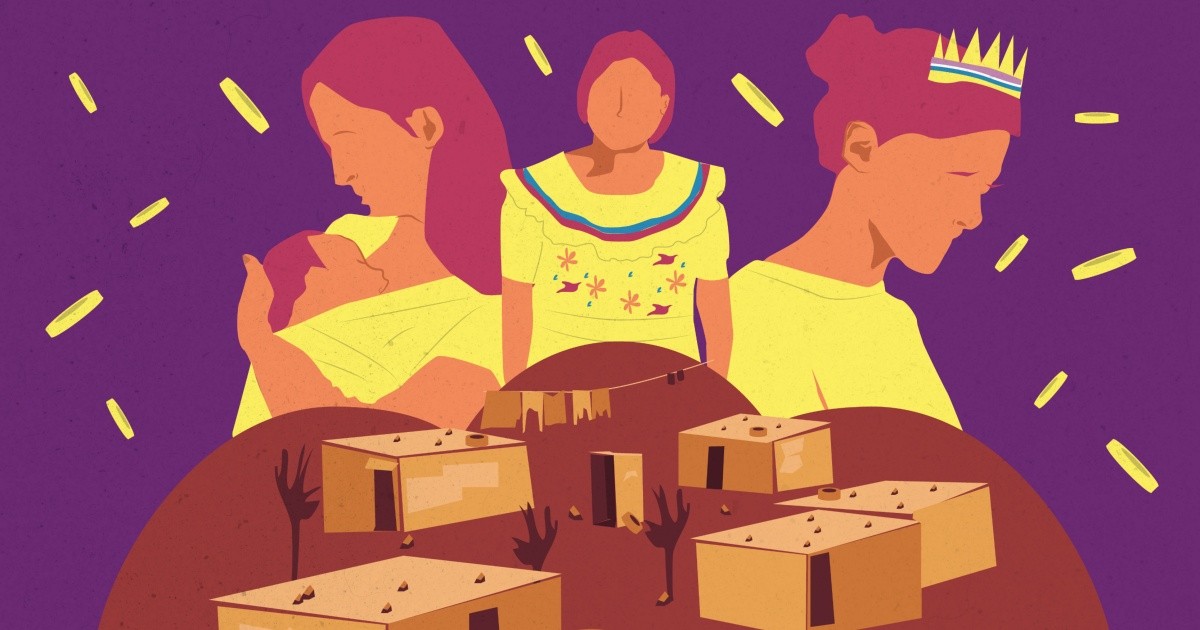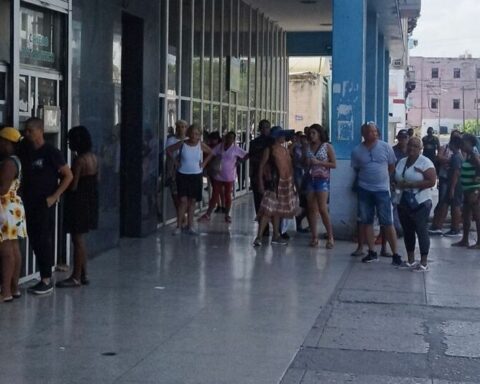A shoe workshop in Camajuaní is an efficient and disciplined machine. The cobblers, hunched over their work tables, try to ignore the security cameras that watch them from the ceiling. There are fans to cool the place, a long and hot warehouse where the artisans cut, sew, hammer, paint and pack the final product.
“The first thing is that the design is ready,” he explains to 14ymedio the administrator of one of these workshops who asks to remain anonymous. “Taking these measurements into account, the material is cut and the pieces are prepared. Then the leather is mounted on the sole, with the help of the mould, gluing and sewing both elements to give them more resistance. Finally, the shoe is cleaned and painted, before putting it away in its box: everything is ready to be sold”.
With the $6,000 he borrowed from his brother-in-law in 2016, he was able to start investing in his project. “Of course, when that money had more value,” she admits. Today it would cost him around 15,000 to start a business of that size. “I started little by little: I made a small workshop with nine workers behind my house, and I bought the machines from some shoemakers who were leaving the country.”
Most of the footwear companies in this municipality of Villa Clara were born during the Special Period. At that time, the manufacture of shoes was an illegal activity, but over time legal channels were opened for its production and commercialization.
The Cuban Fund for Cultural Goods is the decisive channel for Camajuaní workshops to import the material they need from abroad and have a platform to sell their product. According to the website of this company, which belongs to the Ministry of Culture, its income “is intended for the acquisition of raw materials, materials, equipment, tools, accessories, supplies and goods for the work of Cuban artists and artisans.”
The Cuban Fund for Cultural Goods is the decisive channel for Camajuaní workshops to import the material they need from abroad and have a platform to sell their product
“All the raw material is imported from Mexico through the subsidiary of the Fund”, assures the administrator from Camajuaní. “When we lack the supplies, we have to make the requests. The Fund passes them to the supplier in Mexico and they send us an offer with the prices. If we agree, we deposit your money in the bank and in a month, more or less, we have the raw material to continue producing”.
Imports critically decreased during the pandemic, so many Camajuana workshops sought local alternatives to make up for the deficit. “Of course the business is profitable,” he continues. “The return on the initial investment is usually a bit slow, between 6 and 12 months. But over the years everything improves.”
Boots, sandals, dress shoes, flip flops; manufacturing in leather, synthetic leather, rubber; imitation of the big brands (Adidas, Nike, Zara); all at a better price than the state offer or the products brought by the “mules” from the United States, Europe or Latin America.
The efficient Camajuaní workshops seem to hold the key to continue producing and distributing, on a larger scale: now the Cuban government seems very interested in helping them.
“Can a small private business set prices that are far from the madness of the market? A company from Camajuaní makes it possible.” This was the promotion of the official reporter Lázaro Manuel Alonso, on his Facebook profile, to the shoe company Jona’s SURL, very well connected with the State’s distribution channels.
“Their specialty is producing shoes,” continued the journalist, “but tomorrow they will make a dream come true: they open their first store with the prices they see in the photos. They show that when intermediaries are eliminated, when those who produce sell, when logic it is not to obtain excessive profits at the expense of the consumer’s pocket, then yes it can. We talked with them several weeks ago about the obstacles to their management and they are one of the protagonists of the second report on the setbacks of the private sector in Cuba.”
Riverón, who was identified as “agent Cristian” of State Security, was involved in the harassment and expulsion of several students and professors from the Central University of Las Villas
Alonso refers to a report he published in the National Television News, dedicated to “criticizing” the management of requests from Cuban self-employed by the state bureaucracy.
In the report, Alonso interviewed several producers throughout the country, including Yoandy Riverón, whom he introduced as “legal advisor” to Jona’s SURL. Riverón, who was identified as “agent Cristian” of State Security, was involved in the harassment and expulsion of several students and professors from the Central University of Las Villas. The most emblematic cases are those of professor Dalila Rodríguez, journalist Karla Pérez González and animal activist Javier Larrea.
Riverón was converted to “entrepreneur” as part of Jona’s SURL, possibly the largest footwear company in Camajuaní, which he represents at national events and before government officials. The store that Lázaro Manuel Alonso speaks of exhibits not only shoes at supposedly reasonable prices, but also paintings of Fidel and Raúl Castro, Miguel Díaz-Canel, and numerous diplomas for “work prowess.”
Jona’s SURL, connected to the Government through Riverón, is directed by Luis Enrique Fernández López, known in Camajuaní as Luisito the Tinkerer. Photographs shared by Yoandy Riverón himself on Facebook demonstrate the luxury with which this business “family” lives and its links with people close to the government, such as Israel Rojas and Yoel Martínez, from the Buena Fe group. Riverón also proudly circulates images of the Jona’s SURL meetings with ministers such as Alejandro Gil Fernández and Inés María Chapman, who have visited their workshops.
Luis Enrique Fernández’s project, advised by Riverón, grows and multiplies its influence. “Many of Luis’s children work in that business,” reveals the shoe manager who interviewed 14ymedio. “It may be that he is giving some of his business to his sons to expand. As to whether Jona’s SURL benefits from any imports that other shoemakers do not have, that is unknown.”
Thanks to the connections of Jona’s SURL, the life of Luis Enrique Fernández, his family and his “advisors” is one of excessive luxury. For example, the son of the magnate from Camajuana, Jonathan Luis Fernández, who works as a “brand boy” for Jona’s SURL, has himself portrayed on networks in the best hotels in the Cuban North Keys and driving a Yamaha R1 motorcycle, whose price is above of the $22,000.
The group, to which the company Calzados Yady’s also belongs, boasts of its donations to hospitals and other public institutions. It is a way of “washing the face” of its management, which links the artisanal producer of the MSMEs with the highest levels of the Government, with the mediation of State Security.
In Camajuaní there are smaller workshops than Jona’s SURL, but they all have their stores and distribution channels covered by the Cuban Fund for Cultural Assets. Other groups such as Yirah-Ebenezer or El Músico are among the companies registered by the Government as MSMEs.
Riverón was converted to “entrepreneur” as part of Jona’s SURL, possibly the largest footwear company in Camajuaní, which he represents at national events and before government officials
Its stores, which are attended by customers from Santa Clara, Remedios, Caibarién, Placetas and many municipalities outside of Villa Clara, sell the “Hawaiian” flip-flop model for 550 pesos. A pair of boots can cost 2,500 and some “tennis” between 1,200 and 2,000. For state-owned companies, Jona’s SURL offers “tennis” and dress shoes at 900 pesos, boots at 1,100, and women’s footwear at 500.
The workforce of the workshops ranges from young people who abandoned their studies to professionals of any age, whose salary was not enough to support their family.
“I’ve always liked working with children,” says a former teacher who now works as a shoemaker. “But for a few years I’ve been earning a living here and I feel good, although sometimes with a little longing.”
“This type of work takes a lot of time,” says a craftsman, “but it pays very well. I have even seen several people who have a permanent job, but the salary is not enough and they go to these places in search of extra income. This is how they carry the soles and the lining to later join them and sew them at home. For this they charge around eight pesos for each pair of shoes.”
“The machines are very old and have a lot of wear,” says another. “They frequently have problems in the hooks, in the dolly, and you have to go to the maintenance shop, so that the turner can repair it.”
New rich, G2 agents, ministers, family mafias, hidden distributors and a workforce that, due to the poverty and high levels of inflation that Cuba is experiencing, needs more and more income to live. These are the components of the footwear industry in Camajuaní, a microclimate that evidences the murky relationship between producers and government officials to overcome – based on complicity and corruption – the acute economic crisis on the Island.
________________________
Collaborate with our work:
The team of 14ymedio is committed to doing serious journalism that reflects the reality of deep Cuba. Thank you for joining us on this long road. We invite you to continue supporting us, but this time becoming a member of our newspaper. Together we can continue transforming journalism in Cuba.








